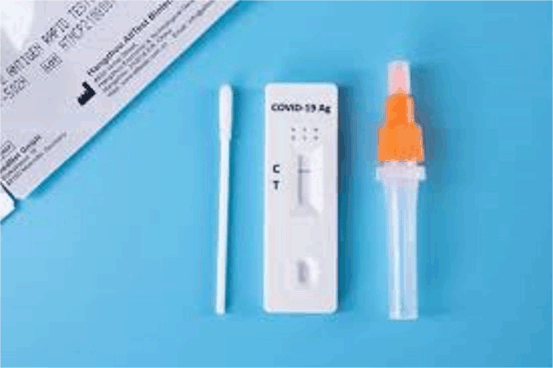독감, RSV 및 코로나19 사례가 곧 증가할 예정인데, 언제 예방접종을 받아야 합니까?
ABC 건강 및 웰빙 /
건강 기자 페이지 콕번(Paige Cockburn)
2024년 3월 27일 수요일 오전 5시 30분 게시됨 2024년 3월 27일 수요일 오전 5시 30분, 업데이트됨 2024년 3월 28일 목요일 오후 2시 26분 2024년 3월 28일 목요일 오후 2시 26분
십대 소녀가 침대에 앉아서 코를 푼다
전문가들은 독감 예방 주사를 맞을 최적의 시기가 빠르게 다가오고 있다고 말합니다.(Getty Images:: Justin Paget)
추운 날씨가 코앞에 다가와 매우 원치 않는 집 손님이 찾아오고 있습니다. 이름은 코로나19(COVID), 인플루엔자, RSV입니다.
일부 전문가들은 독감 시즌이 특히 좋지 않을 것으로 예측하고 있으며, 백신 접종률이 계속 낮아져 입원 환자가 늘어날 것이라는 우려도 있습니다.
무서운 “플루로나(flu-rona)”에 대한 이야기도 있습니다.
과거 경험에 따르면 RSV 감염은 대개 4월경에 곧 증가할 것입니다. 일부 백신 지침도 최근 변경되었습니다.
최신 조언을 풀어 보겠습니다.
인플루엔자
2023년 독감 시즌은 특히 길었지만 2024년 시즌은 더욱 악화될 수 있다고 왕립 호주 GP 대학(Royal Australian College of GPs)의 부회장이자 농촌 의장인 마이클 클레먼츠(Michael Clements)는 말합니다.
“우리는 과거에 [팬데믹 기간 동안] 고립되어 있었기 때문에 집단 면역이 많지 않았습니다.
“국제 여행이 본격적으로 진행되고 있으며 우리는 일반적으로 북반구에서 독감을 수입합니다.”
그러나 그는 감염률이 높다는 것은 사람들이 이제 집에서 테스트 키트를 구입하여 인플루엔자나 RSV에 감염되었는지 확인할 수 있다는 사실을 반영할 수도 있다고 말했습니다.
“그래서 과거에는 그들이 인플루엔자에 걸렸다는 사실조차 알지 못했을 수도 있습니다.”
유아 딸의 코를 닦아주는 아버지
6개월에서 5세 사이의 어린이는 심각한 인플루엔자 증상이 나타날 위험이 높습니다.(Getty Images: MoMo Productions)
웨스턴오스트레일리아 대학의 소아 전염병 교수인 크리스토퍼 블라이스(Christopher Blyth)는 인플루엔자 계절이 매번 다르기 때문에 많은 예측을 하기가 어렵다고 말했습니다.
“하지만 제가 말씀드리고 싶은 것은 올해도 매년 그랬듯이 상당수의 어린이들이 인플루엔자로 병원에 입원하게 될 것이라는 것입니다.”
지난해에는 5~9세 어린이의 인플루엔자 신고율이 가장 높았으며, 16세 미만 어린이의 사망자 수는 코로나19 팬데믹 이전 연도보다 높았습니다.
Telethon Kids Institute의 Wesfarmers 백신 및 전염병 센터 소장인 Blyth 교수는 “입원한 어린이의 대부분은 건강이 양호하지만 예방접종을 받지 않았습니다.”라고 말했습니다.
최신 정부 데이터에 따르면, 올해 이맘때 인플루엔자 사례는 예상보다 높습니다(작년 같은 시기보다 약 1.7배 증가).
예방접종 안내서:
6개월 이상의 모든 사람에게 매년 인플루엔자 예방접종을 권장합니다.
다음 그룹은 국가 예방접종 프로그램(NIP)에 따라 무료로 백신을 접종받을 수 있습니다.
6개월에서 5세 사이의 어린이
65세 이상
원주민과 토레스 해협 섬주민
임신한 사람
중증 인플루엔자의 위험을 증가시키는 건강 상태가 있는 사람
퀸스랜드 정부는 또한 최근 NIP가 적용되지 않는 모든 주민에게 독감 백신 비용을 지불하겠다고 발표했습니다.
클레멘츠 박사는 약국에서 백신이 조금씩 유입되기 시작했지만 정부 재고는 4월 초쯤에야 조달될 예정이라고 말했습니다.
“어떤 사람들은 정말 열성적이라는 것을 알고 있지만 우리는 실제로 백신의 최대 효과를 얻기까지 한 달 정도 걸리고 4~6개월 사이에 점점 줄어들기 때문에 기다려도 괜찮다고 말하고 싶습니다.”
Blyth 교수는 4월에 백신을 접종한다는 것은 5월에 감염이 급증하기 시작할 때 보호를 받고 일반적으로 8월에 정점에 도달할 때에도 여전히 보장을 받는다는 것을 의미한다고 말했습니다.
어린 아이에게 코로나19 백신 접종을 하고 있는 모습.
인플루엔자 바이러스 변종이 변이하기 때문에 매년 독감 백신이 필요합니다.(ABC News: Herlyn Kaur)
지난해 예방접종률은 인구의 약 32%가 접종을 받을 정도로 낮았다.
클레멘츠 박사는 사람들이 예방할 수 있는 질병으로 고통받는 것을 보는 것이 “가슴 아프다”며 특히 올해 더 많은 임산부와 어린 아이들이 예방접종을 받는 것을 보고 싶다고 말했습니다.
그는 백신 섭취량이 높을수록 감염의 정점이 낮아진다고 말했습니다. 이는 예방접종을 받지 않은 사람들을 포함하여 지역사회 전체를 더욱 안전하게 만들 것입니다.
“백신을 맞을 수 없거나 백신을 맞고도 효과가 없는 사람들이 항상 있기 때문입니다.”
백신의 효과율은 40~60%이다.
RSV
호흡기 세포융합 바이러스(RSV) 감염은 흔하며 매우 파괴적일 수 있습니다.
“대부분의 부모는 자녀가 습한 기침을 할까봐 걱정하면서 밤에 깨어 있었다는 좋은 기록을 가지고 있습니다.”라고 Clements 박사는 말합니다.
“노인의 경우 RSV가 폐렴을 유발하여 사망에 이르게 하는 경우가 많습니다.”
의사들은 만성 기침을 조사해야 한다고 말합니다.
기도를 깨끗하게 유지하고 먼지와 같은 이물질을 제거하려면 기침이 필요합니다. 그러나 호흡기 전문가들은 오래 지속되는 기침에 대해서는 조사가 필요하다고 말합니다.
큰 눈, 큰 안경, 짙은 금발 머리, 앞머리를 가진 진지한 어린 소녀가
안경을 쓴 진지한 나이든 여성.
더 읽어보세요
이 바이러스는 폐와 호흡 통로를 감염시킬 수 있으며 전국적으로 영유아 입원의 주요 원인입니다.
RSV는 개인이 상대적으로 빨리 면역력을 잃기 때문에 매우 흔합니다. 재감염은 마지막 감염 후 2개월 만에 발생할 수 있습니다.
Blyth 교수는 “앞으로 몇 주에서 몇 달 안에 RSV가 많이 생길 것입니다. 이는 소아 병원에서 병상 막힘의 주요 원인 중 하나입니다”라고 말했습니다.
RSV는 일반적으로 남부 주에서는 4월에서 7월 사이에 급증하는 반면, 열대 지방의 사례 수는 일년 내내 더 일관적일 수 있습니다.
예방접종 안내서:
수년 동안 호주인들은 예방접종을 받지 못한 채 RSV로 고통받아 왔습니다.
그러나 올 가을 처음으로 일부 사람들에게는 더 이상 그렇지 않습니다.
작년에 TGA(Therapeutic Goods Administration)는 Nirsevimab이라는 약물을 승인했습니다. 이 약물은 최대 5개월 동안 감염을 약 75% 감소시키는 것으로 알려진 장기간 작용하는 항체입니다.
Nirsevimab은 현재 국가 예방접종 프로그램(NIP)의 일부가 아니지만 일부 주에서는 유아 및 어린이를 위한 무료 예방접종 프로그램을 운영하고 있습니다.
이달 초 서호주 정부는 4월부터 8개월 미만(또는 중증 RSV 위험이 높은 아기의 경우 최대 19개월) 모든 아기에게 Nirsevimab을 무료로 제공할 것이라고 발표했습니다.
이번 주에 퀸즈랜드와 뉴사우스웨일스 정부도 이에 따라 자체 무료 RSV 예방접종 프로그램을 발표했습니다.
퀸즈랜드에서는 신생아, 8개월 미만의 원주민 및 토레스 해협 섬 주민 유아, 복잡한 질병을 앓고 있는 특정 유아가 자격이 있습니다.
뉴사우스웨일스에서는 2023년 10월 31일 이후에 태어난 조산아, 2023년 10월 31일 이후에 태어난 모든 원주민 및 토레스 해협 섬주민 아기, 특정 취약한 유아가 보장됩니다.
보다
지속 시간: 6분 48초6분
RSV에 대한 무료 예방접종의 전국적 시행을 요구합니다.
별도의 개발로 60세 이상의 호주인은 향후 무료 RSV 백신을 접종받을 수 있습니다.
TGA는 최근 RSV로 인한 하부 호흡기 질환 예방을 위한 단백질 기반 백신인 AREXVY를 승인했습니다.
현재 NIP를 통해 자금이 지원되지 않기 때문에 개인 처방전(소비자가 전액 지불함을 의미)으로만 구입할 수 있습니다.
그러나 AREXVY 제조업체는 NIP를 통해 백신을 무료로 제공하도록 신청했으며 Clements 박사는 이것이 내년에 이루어질 수 있다고 믿습니다.
코로나 19
Blyth 교수는 현재 코로나19 전파율은 낮지만 인플루엔자와 RSV가 최고조에 달할 때쯤 사례가 증가할 것으로 예상된다고 말했습니다.
“우리는 코로나19가 또 다른 기침이나 감기에 편승해 RSV에 걸린 사람이 코로나19에 걸리고 이중 감염을 겪게 되어 더욱 아플 수 있다는 점을 우려하고 있습니다.”라고 클레멘츠 박사는 말했습니다.
“플루로나(flu-rona)라고 알려져 있습니다.”
Blyth 교수는 가장 위험에 처할 사람들은 호주 노인들과 면역력이 저하된 사람들일 것이라고 말했습니다.
Instagram 피드의 ABC Health
Instagram에서 @abchealth를 팔로우하세요. 오해를 깨고 실용적이고 현명한 건강 조언을 공유하고 있습니다.
더 읽어보세요
예방접종 안내서:
지난달 정부는 코로나19 예방접종 지침을 업데이트했다.
이제 6개월마다 추가 접종을 하는 것은 75세 이상의 사람들에게만 권장됩니다.
18세 이상이면 누구나 연간 부스터를 받을 수 있습니다.
그러나 65~74세이거나 면역력이 심하게 저하된 경우에는 6개월마다 추가 접종을 받을 수 있습니다. 위험과 이점에 대해 의사와 상담하십시오.
면역력이 저하되지 않은 5세~17세 사이의 사람들에게는 현재 추가 접종이 권장되지 않습니다.
면역력이 심하게 저하된 이 연령대의 개인은 12개월마다 추가 접종을 받을 수 있습니다.
5세 미만 어린이에게는 현재 부스터 사용이 권장되지 않습니다.
다른 건 없나요?
Clements 박사와 Blyth 교수는 모든 호주인에게 정기적인 예방 접종을 제대로 받았는지 GP에게 문의할 것을 촉구합니다.
여기에는 국가 예방접종 프로그램(NIP)에 따라 65세 이상 노인과 면역이 저하된 18세 미만 특정 그룹을 포함하여 가장 위험에 처한 사람들에게 무료로 제공되는 대상포진 예방접종이 포함됩니다.
호주 노인들에게는 새로운 대상포진 접종이 무료로 제공됩니다.
대상포진 발병 위험은 나이가 들수록 증가합니다. 그러나 90%의 효과가 있을 것으로 예상되는 새로운 백신이 이제 노년층과 면역력이 저하된 호주인들을 대상으로 전국 예방접종 프로그램을 통해 제공되고 있습니다.
대상포진이 발병한 사람
더 읽어보세요
폐렴구균 백신도 또 다른 중요한 백신입니다.
폐렴구균성 질환은 폐렴, 뇌수막염 등 다양한 질병을 유발할 수 있으며, 어린이와 노인이 가장 위험합니다.
어린이, 70세 이상의 성인, 50세 이상의 원주민 및 토레스 해협 섬 주민을 포함한 특정 그룹에게는 NIP에 따라 무료입니다.
Blyth 교수는 “계절성 바이러스로부터 자신을 보호하는 것뿐만 아니라 일상적인 일을 최신 상태로 유지하는 것도 중요합니다.”라고 말합니다.
에스.
편집자 주: 이 이야기의 이전 버전에서는 18세 이상의 모든 사람이 매년 코로나19 백신 추가 접종을 받도록 권고받았다고 밝혔습니다. 이는 18세 이상(5~17세 사이의 중증 면역 저하자 포함)이 매년 추가 접종을 받을 수 있다는 건강 조언을 더 잘 반영하기 위해 개정되었습니다.
받은 편지함의 건강
ABC 전체에서 최신 건강 뉴스와 정보를 받아보세요.
귀하의 정보는 ABC 개인정보 수집 정책에 따라 처리됩니다.
이 사이트는 reCAPTCHA로 보호되며 Google 개인정보 보호정책 및 서비스 약관이 적용됩니다.
이메일 주소
당신의 이메일 주소를 입력 해주세요
구독하다
게시일: 2024년 3월 27일, 2024년 3월, 업데이트: 2024년 3월 28일
Flu, RSV and COVID cases are set to rise soon, so when should you get vaccinated?
/
By health reporter Paige Cockburn
Posted Wed 27 Mar 2024 at 5:30amWednesday 27 Mar 2024 at 5:30am, updated Thu 28 Mar 2024 at 2:26pmThursday 28 Mar 2024 at 2:26pm
Cooler weather is on our doorstep and it’s bringing some very unwanted house guests — their names are COVID, influenza and RSV.
Some experts are predicting a particularly bad flu season and there’s concern vaccine uptake will remain low and, in turn, hospitalisations will increase.
There’s also talk of the dreaded “flu-rona”.
Past experience shows RSV infections will ramp up soon too, usually around April. Some vaccine guidelines have also recently changed.
Let’s unpack the latest advice.
Influenza
The 2023 flu season was particularly long, but the 2024 season could be even worse, says Michael Clements, vice president and rural chair of the Royal Australian College of GPs.
“We’ve been isolated in the past [during the pandemic] so there isn’t a lot of herd immunity.
“International travel is full steam ahead and we typically import our influenza from the northern hemisphere.”
However, he says a higher rate of infections can also reflect the fact people can now buy at-home testing kits and find out if they have influenza or RSV.
“So in the past we may never have even known they had influenza.”
Christopher Blyth, a paediatric infectious diseases professor with the University of Western Australia, says every influenza season is different so it’s hard to make many predictions.
“But what I will say is a significant number of children will be hospitalised with influenza this year, like every year.”
Last year, children between the ages of five and nine had the highest influenza notification rates, and the number of deaths in children under 16 was higher than in many pre-COVID pandemic years.
“The bulk of children hospitalised are in good health, they just aren’t vaccinated,” says Professor Blyth, who’s the director of the Wesfarmers Centre of Vaccines and Infectious Diseases at the Telethon Kids Institute.
According to the latest government data, influenza cases are higher than expected for this time of year (around 1.7 times greater than the same time last year).
Your immunisation guide:
Annual influenza vaccination is recommended for everyone over six months of age.
The following groups can receive their vaccine for free under the National Immunisation Program (NIP):
- children aged between six months and five years
- those over 65
- Aboriginal and Torres Strait Islander people
- anyone pregnant
- those with medical conditions that increase their risk of severe influenza
The Queensland government also recently announced it would pay the cost of the flu vaccine for all residents not covered by the NIP.
Dr Clements says pharmacies are starting to see vaccines trickle in, but the government stock is not due until around early April.
“I know some people are really keen but we actually want to tell them it’s OK to wait, as it takes a month or so to get peak effect from the vaccine and it does taper off at between four to six months.”
Professor Blyth says getting a vaccine in April will mean you’re protected when infections start ramping up in May and still be covered for the peak, which is typically in August.
Vaccination coverage last year was low, with around 32 per cent of the population vaccinated.
Dr Clements says it’s “heartbreaking” to see people suffer from something preventable and he particularly wants to see more pregnant women and young children vaccinated this year.
He says the higher the vaccine uptake, the lower the peak of infections. This will make the entire community safer, including those who aren’t vaccinated.
“Because there’s always people who can’t get the vaccine or have it but it doesn’t work.”
The vaccine’s effectiveness rate is between 40 to 60 per cent.
RSV
Respiratory syncytial virus (RSV) infections are common and can be very disruptive.
“Most parents can give a really good history of being awake at night worried about the wet cough their child has,” Dr Clements says.
“For the elderly, it’s often RSV that triggers the pneumonia that kills them.”
Chronic cough should be investigated, say doctors
The virus can infect the lungs and breathing passages and is the leading cause of hospitalisations in infants nationwide.
RSV is so common partly because individuals lose their immunity to it relatively quickly. Reinfection can occur just two months after the last infection.
“In the next couple of weeks to months we will have plenty of RSV. It’s one of the major causes of bed block in paediatric hospitals,” Professor Blyth says.
RSV normally surges around April to July in the southern states, while case numbers in the tropics can be more consistent throughout the year.
Your immunisation guide:
For years, Australians have suffered through RSV without the option of immunisation.
But this autumn, for the first time, that’s no longer the case for some people.
The Therapeutic Goods Administration (TGA) last year approved a drug called Nirsevimab, which is a long-acting antibody that’s been shown to reduce infections by about 75 per cent for up to five months.
While Nirsevimab is not currently part of the National Immunisation Program (NIP), some states have free immunisation programs for infants and children.
Earlier this month, the Western Australian government announced it will provide free access to Nirsevimab from April for all babies under eight months (or up to 19 months for those at increased risk of severe RSV).
This week, the Queensland and New South Wales governments followed suit and announced their own free RSV immunisation programs.
In Queensland, newborn infants, Aboriginal and Torres Strait Islander infants less than eight months of age and certain infants with complex medical conditions are eligible.
In New South Wales, premature babies born after October 31, 2023, all Aboriginal and Torres Strait Islander babies born after October 31, 2023 and certain vulnerable infants are covered.
In a separate development, Australians over the age of 60 may have access to a free RSV vaccine in the future.
The TGA recently approved AREXVY which is a protein-based vaccine for the prevention of lower respiratory tract disease caused by RSV.
It is currently only available on private prescription (which means the consumer pays the full cost) as it’s not funded through the NIP.
However the manufacturer of AREXVY has applied for the vaccine to be made available for free through the NIP, and Dr Clements believes this could happen next year.
COVID-19
COVID-19 transmission is low at the moment, Professor Blyth says, but cases are expected to rise around the same time as the influenza and RSV peaks.
“We’re concerned COVID will just piggyback onto another cough or cold so if someone has RSV they might then happen to get COVID and have dual infections and be even sicker,” Dr Clements says.
“It’s known as flu-rona”.
Professor Blyth says those who will be most at risk will be older Australians and those who are immunocompromised.
ABC Health in your Instagram feed
Your immunisation guide:
Last month the government updated its COVID-19 vaccination guidelines.
Six-monthly boosters are now only recommended for those over the age of 75.
Anyone over 18 can have an annual booster.
But if you’re 65 to 74 or severely immunocompromised you can have a six-monthly booster. Talk to your doctor about the risks and benefits.
A booster is not currently recommended for those between the ages of five and 17 who are not immunocompromised.
Individuals in this age group who are severely immunocompromised can get a booster every 12 months.
Children under five are not currently recommended to have a booster.
Anything else?
Both Dr Clements and Professor Blyth urge all Australians to check with their GP about whether they’re up to date with routine vaccinations.
This includes the shingles vaccination, which is free under the National Immunisation Program (NIP) for those most at risk, including anyone over the age of 65 and select groups under 18 who are immunocompromised.
New shingles jab free for older Australians
The pneumococcal vaccine is another important one.
Pneumococcal disease can cause a variety of diseases, like pneumonia and meningitis, and young children and the elderly are most at risk.
It is free under the NIP for certain groups including children, adults aged 70 and over and Aboriginal and Torres Strait Islanders aged 50 and over.
“It’s not just about protecting yourself against the seasonal viruses but it’s about keeping up to date with the routine stuff too,” Professor Blyth says.
Editor’s note: An earlier version of this story said anyone over the age of 18 was advised to have an annual COVID-19 vaccine booster. This has been amended to better reflect the health advice which says those over 18 (as well as severely immunocompromised individuals aged between 5 –17 years) can receive an annual booster.
Health in your inbox
Get the latest health news and information from across the ABC.
Your information is being handled in accordance with the ABC Privacy Collection Statement.
This site is protected by reCAPTCHA and the Google Privacy Policy and Terms of Service apply.
Posted 27 Mar 202427 Mar 2024, updated 28 Mar 2024










